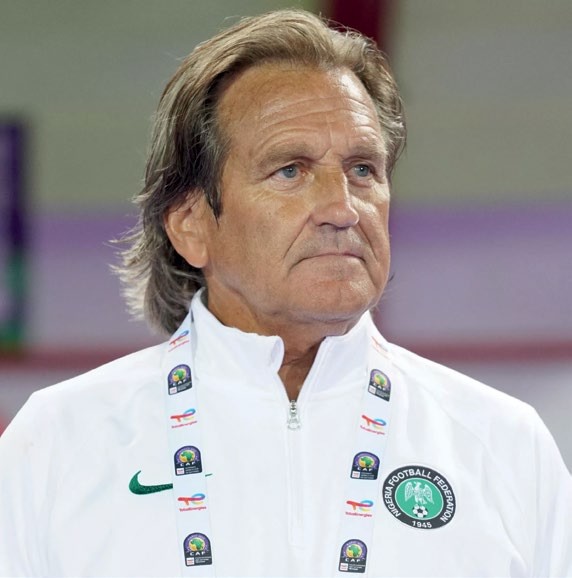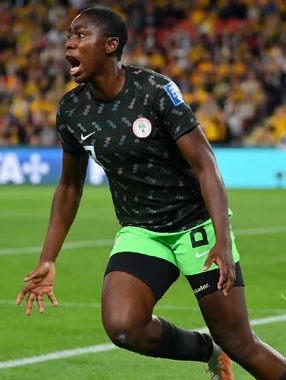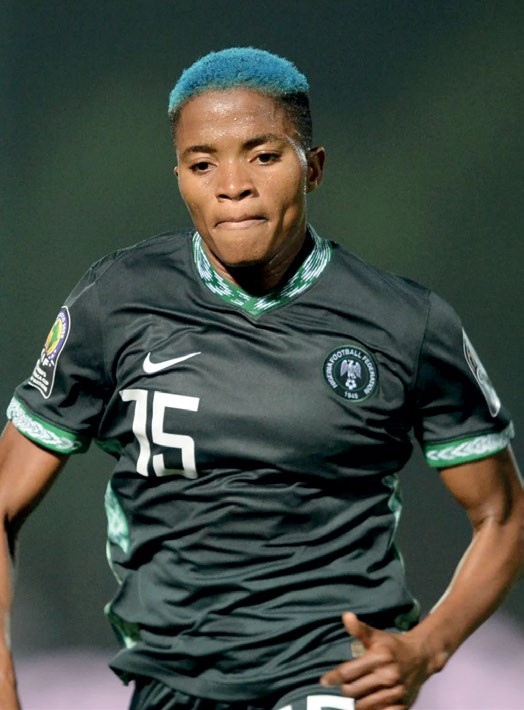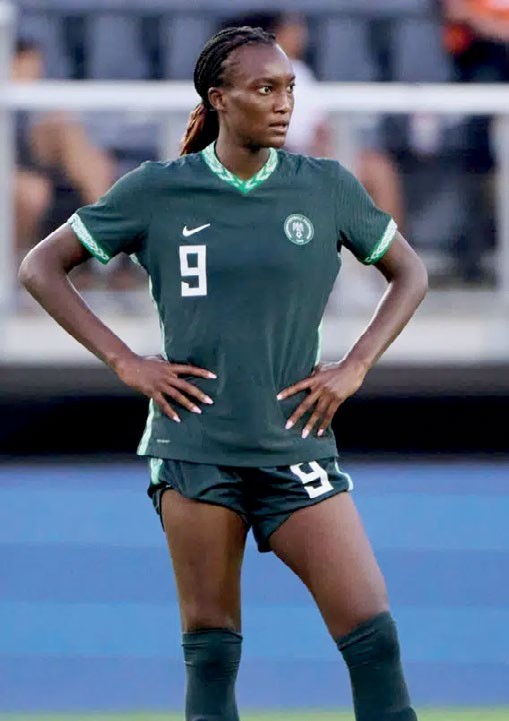October 29, (THEWILL) – Nigeria’s senior women’s football team appears once again to be hamstrung by the jinx of not making it to the Olympics. The Super Falcons were held to a 1-1 draw by Ethiopia in the first leg of their CAF Women’s Olympic qualification match at the Addis Ababa Stadium on Wednesday last week. It was a disappointing result, especially on the back of the team’s impressive outing at the FIFA World Cup in Australia and New Zealand between July and August this year.
The Addis Ababa match was Nigeria’s first competitive game since their quarter-final exit on penalties to England at the World Cup. The Super Falcons, who are ranked 32nd in the world, were expected to dominate their opponents, who are ranked 124th. Yet, they found it hard to break down the resilient Ethiopians. Ethiopia impressively took a shock lead in the fifth minute when Birkie Amare scored from a corner kick from the left. The goal exposed deficiencies in the Nigerian defence, as Amare was left unmarked in the box.

The Super Falcons tried to respond after going behind early, but they were frustrated by the organised Ethiopian defence and goalkeeper throughout the first half. Nigeria’s captain Rasheedat Ajibade, who plays for Spanish club Atletico Madrid, scored the equaliser in the 49th minute with a stunning long-range strike that left the Ethiopian keeper helpless. Ajibade was one of the few bright spots for Nigeria, as she showed her leadership and quality throughout the game.

However, Nigeria could not find a winner, despite creating some chances in the second half. Gift Monday had a shot blocked in the 27th minute, while Ifeoma Onumonu had a goal disallowed for offside in the 92nd minute after substitute Ngozi Okobi set her through on goal. The result leaves the tie finely balanced ahead of the second leg in Nigeria next week. The winner of the tie will advance to the final round of the CAF Olympic qualification, where they will face either Cameroon or Uganda for a spot in the next round of qualifiers for the Tokyo 2020 Olympics.

Why did the Super Falcons, widely regarded as the best women’s football team in Africa, having won nine out of 11 African Women’s Championships, struggle against Ethiopia? It is even more eyebrow-raising how a team that also made good work of their time at the World Cup this year, becoming one of the African teams to make it to the quarter-finals, where they lost only on penalties to England. Why then was their performance against Ethiopia far from impressive? The analysis of the match cleared showed that the team lacked cohesion, creativity, and there was an urgency in their play that affected keeping possession of the ball. There is also the high altitude of Addis Ababa to consider, which could affect players not accustomed to playing at such heights.
Some of the players who starred at the World Cup failed to replicate their form against Ethiopia. Asisat Oshoala, who is the most decorated African player and who stars impressively at Barcelona, was largely anonymous against Ethiopia. She was profligate with the chances that came her way, including a one-on-one with the goalkeeper before the shot wildly off target. She was rightly substituted with debutant Esther Ajakaye in the 80th minute after an ineffective performance.
Chiamaka Nnadozie, despite not being the captain, put up a strong display as the goalkeeper, making crucial saves and only conceding a goal due to a goalmouth scramble. The defensive line, including Tosin Demehin and Akudo Ogbonna, had a shaky game. Michelle Alozie’s energetic effort on the left side did not make a significant impact, while Nicole Payne’s return was uneventful. In midfield, Peace Efih excelled in a defensive role, Toni Payne had a solid performance, and the captain Ajibade scored a spectacular goal and pressed effectively. Upfront, Gift Monday was aggressive but could not find the net, and Uchenna Kanu had a poor game, being involved in the opposition’s goal.

Coach Randy Waldrum was also absent from the match due to his commitments with the University of Pittsburgh women’s team in the United States. This likely affected Nigeria’s coordination and tactical preparation. The Nigerian Football Federation (NFF) may need to review Waldrum’s contract to ensure more focus on the Super Falcons. Despite their disappointing performance, there were some positives for Nigeria. Ajibade was undoubtedly Nigeria’s best player on the day. She scored a superb goal and showed her versatility by playing in different positions. Ajibade started as a winger, then moved to central midfield, and finally played as a striker. Her leadership, technical quality and attacking threat will be crucial for Nigeria in the second leg. Ajibade is only 21 years old but has already established herself as one of Nigeria’s most important players.
Another positive was goalkeeper Nnadozie, who made some important saves to keep Nigeria in the game. She showed confidence and composure despite Nigeria’s defensive struggles. The 22-year-old continues to demonstrate her wealth of quality between the sticks as she does at the club level for Paris FC.
Still, the Super Falcons will have to raise their game significantly in the second leg against Ethiopia. They will need better concentration and organisation defensively to contain Ethiopia’s counters and set pieces. Waldrum, upon his return, will have to improve Nigeria’s midfield structure and ball circulation. The team needs to keep possession better and supply the likes of Oshoala and Ajibade in dangerous areas consistently. The experienced players must also step up and produce their best in the second leg. Their quality and decision making in all departments of the game, defence, midfield and attack, will be key.
Nigeria should also use their home advantage well by playing with more pace, urgency and directness in their attack. The support of the home crowd could provide an extra lift if Nigeria plays at a high tempo. Bringing on substitutes like Ajakaye earlier in the match could inject additional energy in attack, if Oshoala continues her blunt form. Tactically, Nigeria may need to press higher up the pitch to pen Ethiopia in their own half.

If they can tighten up defensively and find their attacking rhythm, Nigeria should still have enough quality to progress to the next round. Yet, they cannot take qualification for granted. Ethiopia has proven they can threaten Nigeria’s Olympic dreams. With the right preparation, motivation and tactics, the Super Falcons are capable of overturning this first leg deficit on home soil. However, they will need to showcase the qualities of African champions versus Ethiopia to avoid a demoralising early impediment against Olympic contention.
There have been arguments online that some of the public spat around the issues of match bonuses between the players and coaching staff, on one side, and the NFF, on the other, may have affected performance. The issue of unpaid match bonuses and allowances has been an ongoing challenge for Nigeria’s women’s national team. The players have often protested delayed or missing payments from the NFF. While the grievances of the players are understandable, the non-payment of bonuses also highlights broader issues affecting women’s football development in Nigeria and Africa.
The NFF has claimed that funds for the women’s bonuses at this year’s World Cup have not come from FIFA and that when they receive them, the players will be duly paid. Indeed, inadequate funding and sponsorship for the women’s game contributes to the inability of the Federation to always fulfil bonus obligations on schedule. Unfortunately, women’s football still lacks the commercial revenue and government support that the men’s game enjoys in Nigeria.
However, the Federation also has a duty to the players to be transparent and proactive on bonus matters. Better communication and accountability from the NFF would help build trust with the Super Falcons. The truth is that these ladies deserve fair compensation for their efforts and achievements for the country. There are also wider concerns that unpaid bonuses attract negative publicity that damages the image of the Super Falcons and slows the progress of the women’s game. Issues with bonuses risk overshadowing the team’s historic achievements.
Still, player protests could also be counterproductive if bonuses become the squad’s main focus. Football authorities argue that training boycotts and distractions over pay could affect the team’s performance and results. Striking a balance between justified player grievances and the big picture growth of the game will require good faith efforts on all sides. The NFF and its sponsors must prioritise investments in the women’s league and youth development.
Meanwhile, the players should not allow external issues to affect their performance as they remain role models and ambassadors for women’s football in Africa. They must strive to ensure that failure to qualify for the Olympics is a thing of the past.
Jude Obafemi is a versatile senior Correspondent at THEWILL Newspapers, excelling in sourcing, researching, and delivering sports news stories for both print and digital publications.





